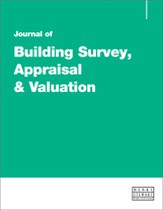Health and safety obligations for a surveyor: Duty of care
Abstract
All professional surveyors, and their organisations, have a duty of care to both those they work with and work for. This includes identifying a wide range of risks and having the competence to understand and mitigate them. Each individual has a different perception of ‘risk’, which may be affected by their age, gender, experience and other matters that affect human behaviour. If we can influence human behaviours to be risk-aware, we should be able to reduce the quantum of incidents that can cause injury and illness. Occupational health and occupational hygiene are two disciplines from which we can draw information to assist in the measurement of risk and how to control it. Many surveyors and/or their customers will be responsible for employing contractors or subcontractors. Within the UK, health and safety cannot be ‘contracted out’; the responsibilities and duty of care remain in line with the chain of management arrangements. Scoping, in formal terms, the responsibilities of all parties to contracts and other agreements is a key fundamental matter for a successful project. Where a serious workplace injury, or fatality, occurs, it is likely that a criminal investigation will follow. When prosecuting, the enforcement authorities are placing increasing focus on the role played by responsible individuals as well as organisations, particularly those with management responsibilities. The consequences of a successful prosecution, in terms of both fines and custodial sentences, have been greatly enhanced due to the recently published Sentencing Guidelines.
The full article is available to subscribers to the journal.
Author's Biography
Anthony Taylor is the Director of Group Health and Safety for GVA, an international real estate consultancy, employing approximately 1,300 surveyors and delivering a wide range of property consultancy services, including property management. Anthony has 30 years’ H&S and operational risk management experience in a wide range of industry sectors including real estate, construction, insurance, local authority, leisure, and for a global tour operator. He currently chairs the RICS Health and Safety Advisory Board, and is a past chair of the Managing Agents Property H&S Forum.
Michael Appleby is a leading Health, Safety and Environment lawyer. He is ranked by Chambers and Partners (2017), the independent legal directory, as a star individual in Health and Safety. Michael has over 20 years’ experience of defending directors, individuals and companies (both national and international) facing investigation/prosecution for health and safety, environmental and manslaughter/corporate manslaughter offences. He has recently successfully judicially reviewed HSE’s Fee for Intervention Scheme (FFI) which has resulted in HSE agreeing to revise its dispute process of the scheme so that it is totally independent from HSE.
Citation
Taylor, Anthony and Appleby, Michael (2017, March 1). Health and safety obligations for a surveyor: Duty of care. In the Journal of Building Survey, Appraisal & Valuation, Volume 5, Issue 4. https://doi.org/10.69554/VROR3363.Publications LLP
